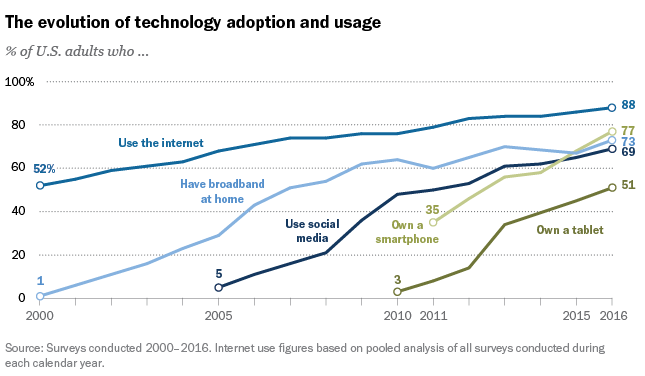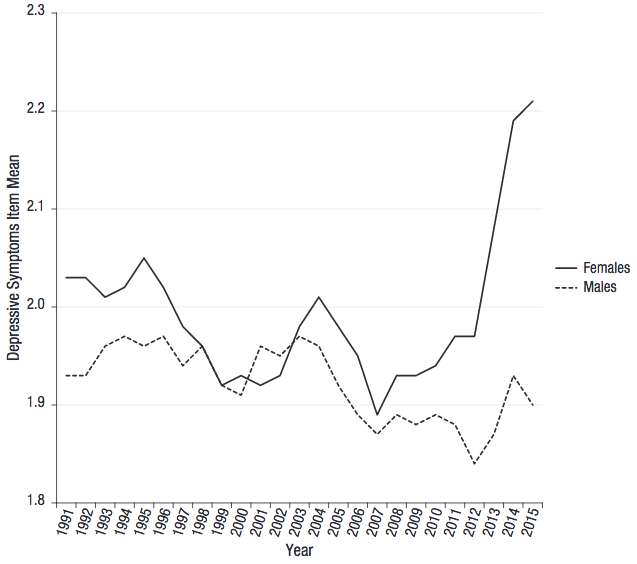|
Between 2010 and 2015, researchers conducted large national surveys and observed a 33% increase in symptoms of depression among U.S. teens, from every background. In addition, suicide attempts among teens increased 23%, and the number suicides among teens increased 31%. After analyzing the data, the researchers observed that the generation of teens born after 1995 is much more likely to experience mental-health issues as compared to their millennial predecessors. The possibility of this rise in depression may be traced back to a major change in the lives of teens': the advent of the smartphone (Twenge, Joiner, Rogers & Martin, 2017). All Signs Point to the Screen According to the Pew Research Center, smartphone ownership breached 75% by 2016. (Smith, 2017). More interestingly, in 2012, smartphone ownership crossed the 50% threshold, right when teen depression and suicide began to increase. Furthermore, the researchers observed a direct relationship between electronic device use and high depressive symptoms, compared to adolescents who spent more time on non-screen activities were less likely. In terms of relative risk, adolescents using electronic devices 3 or more hours a day were 34% more likely to have at least one suicide-related outcome than those using devices 2 or fewer hours a day, and adolescents using social media sites every day were 13% more likely to report high levels of depressive symptoms than those using social media less often. Among those who used electronic devices 5 or more hours a day, 48% had at least one suicide-related outcome. Thus, adolescents using devices 5 or more hours a day (vs. 1 hour) were 66% more likely to have at least one suicide-related outcome. Of course, it’s possible that instead of time online causing depression, depression causes more time online. But three other studies show that is unlikely (at least when viewed through social media use) (Kross et al., 2013; Shakya & Christakis, 2017; Tromholt, 2016). The argument that depression might cause people to spend more time online also doesn’t explain why depression increased so suddenly after 2012. Under that scenario, more teens became depressed for an unknown reason and then started buying smartphones. Are You Addicted to Your Smartphone A recent poll indicates that 50% of teenagers feel addicted to their mobile devices (Commonsensemedia.org, 2017). Could this be due to the hit of dopamine received by the smartphone user? A Solution: Face to Face Interaction Researchers have observed that teens now spend much less time interacting with their friends in person. Interacting with people face to face is one of the deepest wellsprings of human happiness; without it, our moods start to suffer and depression often follows (Baumeister & Leary, 1995). Feeling socially isolated is also one of the major risk factors for suicide (Joiner, 2009). Researchers discovered teens who spent more time than average online and less time than average with friends in person were the most likely to be depressed. The link between smartphone use and depression isn't completely definitive, however, given the possible consequences of depression and suicide, the downside to limiting screen time — say, to two hours a day or less — is minimal. References Baumeister, R. and Leary, M. (1995). The need to belong: Desire for interpersonal attachments as a fundamental human motivation. Psychological Bulletin, 117(3), pp.497-529. https://doi.org/10.1037//0033-2909.117.3.497
Commonsensemedia.org. (2017). Dealing with Devices: The Parent-Teen Dynamic | Common Sense Media. [online] Available at: https://www.commonsensemedia.org/technology-addiction-concern-controversy-and-finding-balance-infographic [Accessed 17 Dec. 2017]. Joiner, T. (2009). The Interpersonal-Psychological Theory of Suicidal Behavior: Current Empirical Status. [online] http://www.apa.org. Available at: http://www.apa.org/science/about/psa/2009/06/sci-brief.aspx [Accessed 17 Dec. 2017]. Kross, E., Verduyn, P., Demiralp, E., Park, J., Lee, D. S., Lin, N., . . . Ybarra, O. (2013). Facebook use predicts declines in subjective wellbeing in young adults. PLOS One , 8 , e69841. https://doi.org/10.1371/journal.pone.0069841 Shakya, H. B., & Christakis, N. A. (2017). Association of Facebook use with compromised wellbeing: A longitudinal study. American Journal of Epidemiology , 185 (3), 203–211. https://doi.org/10.1093/aje/kww189 Smith, A. (2017). Record shares of Americans now own smartphones, have home broadband. [online] Pew Research Center. Available at: http://www.pewresearch.org/fact-tank/2017/01/12/evolution-of-technology/ [Accessed 17 Dec. 2017]. Tromholt, M. (2016). The Facebook experiment: Quitting Facebook leads to higher levels of wellbeing. Cyberpsychology, Behavior, and Social Networking , 19 , 661–666. https://doi.org/10.1089/cyber.2016.0259 Twenge, J. (2017). Teenage depression and suicide are way up — and so is smartphone use. [online] Washington Post. Available at: https://www.washingtonpost.com/national/health-science/teenage-depression-and-suicide-are-way-up--and-so-is-smartphone-use/2017/11/17/624641ea-ca13-11e7-8321-481fd63f174d_story.html?utm_term=.67c97f868d0b [Accessed 17 Dec. 2017]. Twenge, J., Joiner, T., Rogers, M. and Martin, G. (2017). Increases in Depressive Symptoms, Suicide-Related Outcomes, and Suicide Rates Among U.S. Adolescents After 2010 and Links to Increased New Media Screen Time. Clinical Psychological Science, p.216770261772337. https://doi.org/10.1177/2167702617723376
3 Comments
In 1965, researchers conducted an experiment on rats exploring the health effects of sugar and fat. The rats were divided into two groups: one group of rats was a fed diet containing 75% fat and no sugar, while the other group was fed a diet containing 15% fat and 60% sucrose. The results of this experiment led the researchers to believe that rats fed sucrose, a simple carbohydrate, developed thiamine deficiency, often leading to cardiovascular disease, while more complex carbohydrates helped create gut bacteria that synthesized thiamine (Nutritional Reviews, 1965). Based on internal documents, the Sugar Research Foundation (SRF) has discounted evidence linking sucrose consumption to cardiovascular disease. This research prompted funding, among the SRF, to understand the relationship between sugar and any metabolic effects related to chronic disease beyond its caloric effects. The foundation (which has organizational ties to the Sugar Association, the International Sugar Research Foundation [ISRF], and ISRF's successor, and the World Sugar Research Organization) led a group of researchers, referred to as Project 259, to study the effect of sugar on gut bacteria in 1967. The researchers observed a positive association between rodent sugar-rich diets and triglyceride levels, which contributed to higher urinary concentrations of beta-glucoronidase, a well-established marker of bladder cancer (Paigen, Peterson and Paigen, 2017). Albeit, the Sugar Association has consistently denied that sucrose has any metabolic effects related to chronic disease. In 2016, the Sugar Association issued a press release criticizing findings from a study published in Cancer Research using multiple mouse models that suggested that dietary sugar induces increased tumor growth and metastasis when compared to a nonsugar starch diet. The Sugar Association stated that no credible link between ingested sugars and cancer has been established. In contrast, evidence suggests that that the sugar industry terminated funding of an animal study that was finding unfavorable results with respect to the association between dietary sugars and cancer, with possible translational importance to humans (Sugar Association, 2016). Researchers have discovered internal documents that suggest the sugar industry muffled research indicating a significant relationship between sugar and adverse health effects including, heart disease and cancer (Kearns, Apollonio & Glantz, 2017). And this isn't the first time the sugar industry has been caught in the act. Researchers uncovered evidence suggesting the sugar industry systematically misrepresented research linking sugar to cancer, obesity, and heart disease (Kearns, Schmidt and Glantz, 2016). In response to the study, the sugar industry released a statement, saying: “The article we are discussing is not actually a study, but a perspective: a collection of speculations and assumptions about events that happened nearly five decades ago, conducted by a group of researchers and funded by individuals and organizations that are known critics of the sugar industry” (Foley, 2017). References Basu, T. (2017). Researchers Publish Bombshell Report That Suggests Sugar Industry Conspiracy. [online] The Daily Beast. Available at: https://www.thedailybeast.com/researchers-publish-bombshell-report-that-suggests-sugar-industry-conspiracy?source=twitter&via=desktop [Accessed 3 Dec. 2017].
Foley, K. (2017). An investigation suggests Big Sugar hid evidence of sucrose’s health effects. [online] Quartz. Available at: https://qz.com/1134313/sugar-health-effects-50-years-ago-the-sugar-industry-hid-evidence-from-the-public/ [Accessed 4 Dec. 2017]. Kearns, C., Apollonio, D. and Glantz, S. (2017). Sugar industry sponsorship of germ-free rodent studies linking sucrose to hyperlipidemia and cancer: An historical analysis of internal documents. PLOS Biology, 15(11), p.e2003460. https://doi.org/10.1371/journal.pbio.2003460 Kearns, C., Schmidt, L. and Glantz, S. (2016). Sugar Industry and Coronary Heart Disease Research. JAMA Internal Medicine, 176(11), p.1680. https://doi.org/10.1001/jamainternmed.2016.5394 Nutritional Reviews. (1965). Dietary fats and intestinal thiamine synthesis in rats. Nutrition Reviews, 23(11), pp.334-336. https://doi.org/10.1111/j.1753-4887.1965.tb02053.x Paigen, K., Peterson, J. and Paigen, B. (2017). Role of Urinary β-Glucuronidase in Human Bladder Cancer. [online] Cancer Research. Available at: http://cancerres.aacrjournals.org/content/44/8/3620.long [Accessed 3 Dec. 2017]. The Sugar Association. (2017). The Sugar Association Response to University of Texas MD Animal Study Linking Sugar to Cancer - The Sugar Association. [online] Available at: https://www.sugar.org/the-sugar-association-response-university-of-texas-md-animal-study-linking-sugar-to-cancer/ [Accessed 4 Dec. 2017]. |
The Awareness domain contains research, news, information, observations, and ideas at the level of self in an effort to intellectualize health concepts.
The Lifestyle domain builds off intellectual concepts and offers practical applications.
Taking care of yourself is at the core of the other domains because the others depend on your health and wellness.
Archives
May 2024
Categories
All
|



 RSS Feed
RSS Feed

